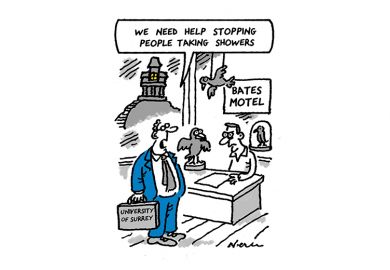
A controversial statue of Prince Philip erected to commemorate his 35-year term as University of Cambridge chancellor must be removed by August, the city council has ordered. Titled The Don, the bronze statue – a four-metre tall, spectral figure with a face painted white and gown and mortarboard painted black – was refused planning permission in 2014, the BBC reported, with a public art coordinator branding it “possibly the poorest quality work that has ever been submitted to the council”. The sculpture, described as being the work of Uruguayan artist Pablo Atchugarry, went on to “appear” in a different location in Cambridge about five years ago, before relocating to its current position on Hills Road. In a blog post, city councillor Katie Thornburrow shared a devastating summation of the beleaguered statue: “It has been described as ‘kitsch-like’ and ‘detritus masquerading as public art’.”
It is an issue known to almost all academics: spend months, if not years, on a piece of research and bust a gut trying to get it published, only for it to muster double-digit views and then sink without a trace. Heather O’Leary, an anthropology professor at the University of South Florida, knew her important but worthy paper on the impact of algae blooms and depletion of coral reefs on the region’s tourism industry risked such a fate, so she hit upon a novel way of ensuring people took notice, NPR reported. Professor O’Leary worked with USF’s School of Music to map the data to different pitches and rhythms and bring it to life “in ways it simply does not on a spreadsheet”. Anyone wondering what algae bloom sounds like when set to music can listen to the final piece online. The short answer: a lot of glockenspiel.
Would you rather perform a 15-second dance or submit a 15,000-word essay in order to pass a class? A viral video has shown students at the University of Tennessee being given exactly that choice, with only one leotard-clad pupil opting for the former, more novel style of assessment. However, the clip’s legitimacy has been called into question by the Daily Mail, a publication long known for its rigorous journalistic standards, suggesting it is probably a ruse on the part of the social media professor leading the class. The publication posits the theory that students aren’t actually being examined, but the video is instead an experiment in going viral, complete with a cartwheeling student actor. While this incident is probably just a teaching moment about how to garner attention online, perhaps the assessment style might still take off – after all, this is one exam that ChatGPT can’t help with.
Internships often get a bad rap, with students and fresh graduates excited to enter the professional workforce only to be beaten down by relentless administrative work and demands for coffee from their seniors, traditionally for minimal or no money. Now, a group of academics in Indonesia has done little to quell concerns about the value of this sort of work experience after allegedly duping students into working at menial jobs in Germany. The students, who believed they were enrolling in a formal internship programme, reportedly found themselves working upwards of 12 hours a day in factories, cafes, and fast-food outlets – and paying for the privilege of doing so. Several of the university staff involved are now under investigation for people trafficking. Unfortunately for the students, they have little to show for their time abroad, other than now knowing the German for “Would you like fries with that?” (Möchtest du Pommes dazu?)
The University of California, Berkeley isn’t best pleased with some of its students’ parents after about 1,300 banded together to hire private security, prompted by a series of carjackings and other crimes. The group, named SafeBears after the university’s mascot, hired six “safety ambassadors” at a cost of more than $40,000 (£31,700) to patrol the area around campus between 6 and 23 March. Berkeley criminal justice law professor Jonathan Simon told The New York Times that the “stunt” would not “significantly alter” safety risks, but rather “reflects the relative privilege of the parents involved”. The SafeBears president disagreed. “I have heard from a lot of students who have expressed gratitude and relief when they say that they saw our security agents patrolling around campus,” Sagar Jethani, parent to twin sophomores, said.
Register to continue
Why register?
- Registration is free and only takes a moment
- Once registered, you can read 3 articles a month
- Sign up for our newsletter
Subscribe
Or subscribe for unlimited access to:
- Unlimited access to news, views, insights & reviews
- Digital editions
- Digital access to THE’s university and college rankings analysis
Already registered or a current subscriber?



